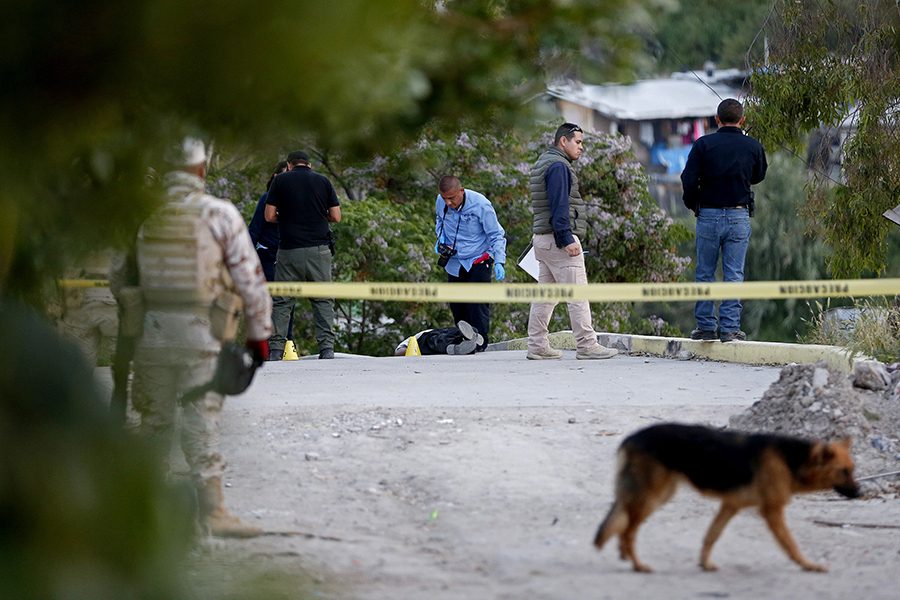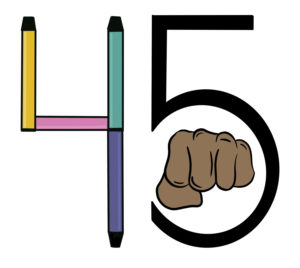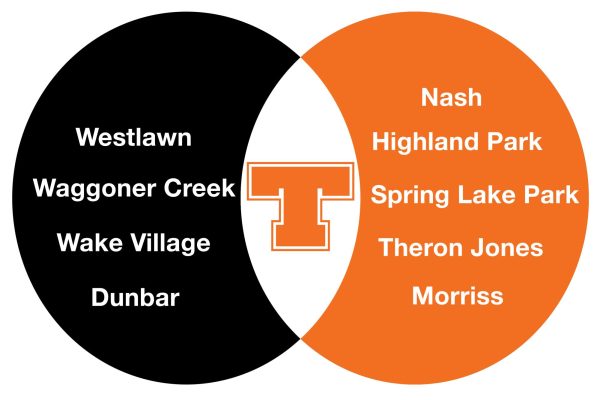More and more people are being murdered in Mexico – and drug cartels are to blame
The months of 2017 have been the deadliest in Mexico since records began to be kept in 1997
A crime scene investigator with the victim in the lower income neighborhood of Colonia Camino Verde, at the scene of a recent drug cartel homicide in Tijuana, Baja Calif., on April 11, 2017. A drug trafficker message by the New Generation Tijuana Cartel was left on the body. (Gary Coronado/Los Angeles Times/TNS)
September 3, 2017
Two cars were following them since they pulled out of the driveway.
He knew, but he decided to keep it from his three sons and his wife who was carrying their one-year-old daughter. Both cars were on his tail without discretion. Inside the cars were a couple of men, no older than 18.
He knew who they were and what they were capable of.
He has read the news about some of them being in his town. Slowly he rolled all the windows down to show who was in the car, to see if they would have mercy on his family. Shortly after, the car sped off. and relief flooded through him.
The next day, the police found a truck the same model as his with all the passengers dead inside. He was terrified at the thought that could have been him and his family last night.
According to Al Jazeera, a website: ‘Mexico violence peaks with over 2,200 murders in June… Official data shows authorities nationwide recorded more than 12,100 homicides probes in the first six months of 2017.
Former President of Mexico, Felipe Calderon, launched a crusade against the drug cartels, spreading tens of thousands soldiers onto local streets to battle gangs. More than a decade later a drug war still rages, as well as the murder rate rising rapidly.
My hometown, Comonfort, Guanajuato, was not an exception to the invasion of cartels. We were all familiar with the regular drug dealers lingering around the streets; but in the beginning of January, cartels began to arrive at Comonfort. They began hiding in huge houses that workers have built for them, for occasions like these, or abandoned warehouses that no one remembers even being there. People didn’t believe that these huge drug dealers were in their town but then months passed, dead bodies were found in abandoned cars or in open fields and it made everyone wonder in fear.
One incident stood out for me. I lived in Mexico for five years before I moved to Texarkana, Texas, but during school vacations I visit Comonfort. It was a late night on an average weekend with my family, we were walking around the plaza looking through the food stands and we decided on eating with our family members at a local food stand. Then we heard what happened to sound like some type of fireworks, or so my family thought. But it wasn’t. It was gunshots, multiple gunshots.
Once everyone in the plaza heard them, it was empty in about five minutes. Schools were canceled, local transportation, such as buses or taxis, stopped passing as frequently as they should, you didn’t see people riding their bicycles or walking on the sidewalk.
The next day news came out that the gunshots were the cops and a small cartel going head to head, with the ending of 22 dead cops. After that nothing was the same; no one went out as late as they used to, not many people went to Mexico during vacations anymore, no one liked to drive at night anymore.
Classmates and friends have asked me if I was ever scared of going to Mexico during vacations. I would answer no. They would give me an uneasy look, then quickly change the subject. I know I am not the only latina that gets asked these questions once in awhile, or gets weird looks when my family walks into public places.
Society has created an image of what Mexico is like based off what problems the country has, how ‘dangerous’ it is to live there, how illegal immigration is the fault of economic and security problems in the United States; poverty, non-assimilation, drugs, crime and exploitation are among some of these problems. The mainstream media, with its bias for bad news, gives the impression that Mexico is a violence-ridden narcotocracy.
That is not the case. Every country has its problems. Every country has its own fare share of crimes going on in the streets. Every country has its economical problems, but they do not get to go around and point their finger at a country to blame.
The media has written articles about Mexico ‘surpassing Iraq and Afghanistan’ to become the world’s second-most deadly conflict zone after Syria. The media has written articles about half of Mexico’s populations is in poverty. Mexico is not what the media makes it seem. Mexico is not what our U.S. president says it is. We do not create rapists, we do not home drugs, we do not ‘send’ bad people to the US; we should not be held responsible for what some individuals have done or the choices that they have made.



















